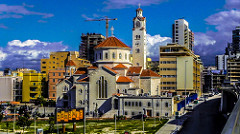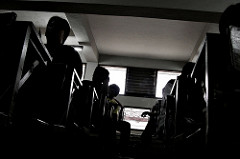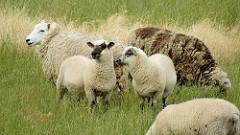By ZAKARIA TAMER
Translated by MAIA TABET
Eat of the Delicacies We Have Bestowed Upon You
It was almost time for lunch. The guests had grown tired of oohing and aahing over the properties, the streams, the lakes, the banks, the airplanes, and the beautiful women.
“You are about to behold a rare kind of sheep which you will soon be eating,” announced the master of the palace and surrounding farms, as he stood pointing with his right index finger at a giant television screen.
The guests stared at the screen, where a gaggle of beautiful young women, shapely and fair-skinned, their silky golden or jet-black hair streaming in the wind, picked flowers as they romped through a verdant garden filled with trees, cavorted in a turquoise pool, splashing one another and laughing, and finally sat around circular tables, surrendering themselves to ravenous and seemingly insatiable appetites as they devoured the finest foods. The master of the domain addressed his guests once more: “When sheep are upset or frightened, their meat is tough and leathery, and it tastes like sawdust. Our sheep enjoy only the happiest of lives, leaving their flesh succulent and juicy, so tender that it melts in the mouth and hardly requires chewing—moreover, they are all slaughtered in the prescribed, halal manner.” Turning to his eager assistant, the master added: “Yahya, please give our guests a brief summary of what is required for halal ritual slaughter.”










